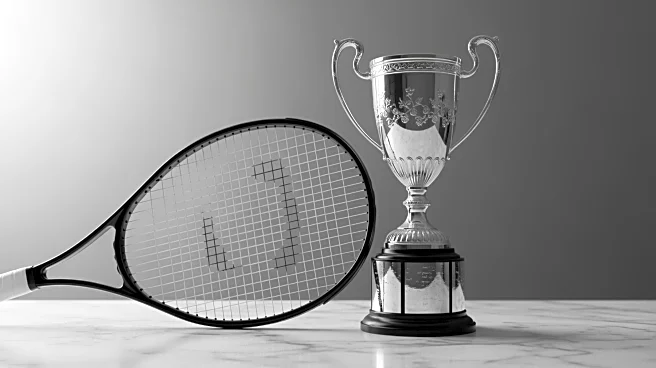What's Happening?
Aryna Sabalenka, a prominent Belarusian tennis player, has experienced a season marked by both triumphs and setbacks. Despite her powerful playing style, Sabalenka has faced challenges in major tournaments, including a loss in the French Open final to Coco
Gauff, where she committed 70 unforced errors. Her emotional response to the defeat led to public criticism, prompting an apology to Gauff. Sabalenka's season also included a loss in the WTA Finals title match to Elena Rybakina, where she admitted to overthinking her game. However, she successfully defended her US Open title and maintained the top ranking for 55 weeks, showcasing her resilience and skill.
Why It's Important?
Sabalenka's journey highlights the emotional and psychological aspects of professional sports, particularly in women's tennis. Her experiences underscore the scrutiny female athletes face regarding their emotional expressions, as noted by tennis legend Billie Jean King. Sabalenka's ability to overcome criticism and maintain her ranking demonstrates her mental and emotional strength, which is crucial for success in high-pressure environments. Her season serves as a reminder of the challenges athletes encounter and the importance of resilience and self-belief in achieving long-term success.
What's Next?
Looking ahead, Sabalenka aims to improve her mental game and reduce unforced errors in future tournaments. Her reflections on the season suggest a focus on emotional management and strategic play. As she prepares for the next season, Sabalenka's ability to learn from past experiences and adapt her approach will be key to her continued success. The tennis community and fans will be watching to see how she evolves her game and whether she can secure more Grand Slam titles.
Beyond the Headlines
Sabalenka's season raises broader questions about the role of emotions in sports and the gendered expectations placed on female athletes. The criticism she faced for her emotional responses highlights societal biases and the need for greater understanding and support for athletes' mental health. Her story may inspire discussions on how sports organizations and media can better address these issues, promoting a more inclusive and supportive environment for all athletes.















